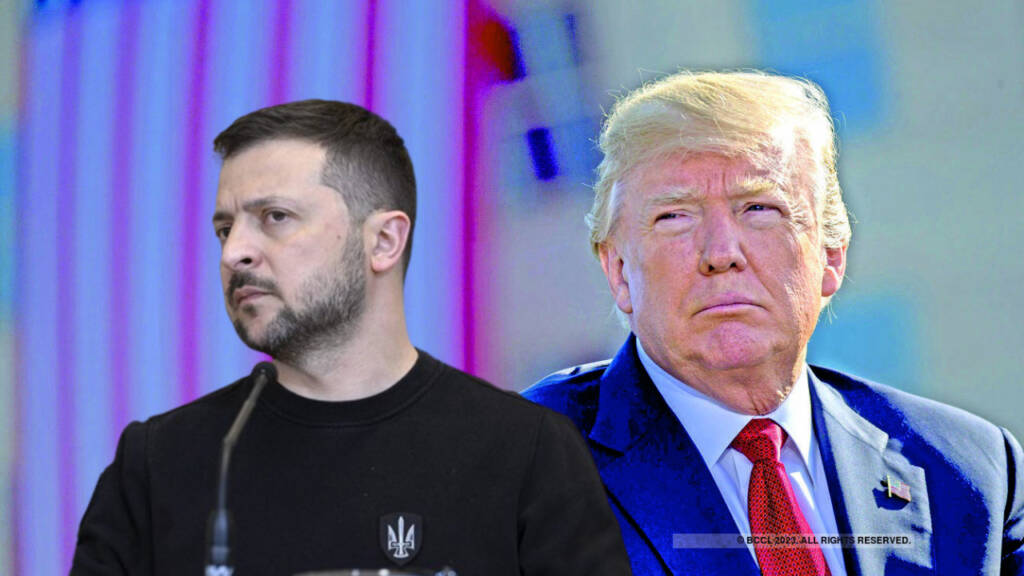The US has a history of involvement in wars overseas. Under President Bill Clinton, the US intervened in the Yugoslavia conflict, leaving Serbia and Kosovo affected. President George W. Bush led the US into wars in Iraq and Afghanistan.
Under President Obama, the Middle East experienced more conflicts. President Biden saw tensions rise in Ukraine. However, during Donald J. Trump’s presidency, there was a notable absence of new wars. Trump’s tenure saw the signing of the Abraham Accords between Israel and several Middle Eastern nations.
Despite this, many American liberals did not acknowledge Trump’s lack of war engagement.
Trump’s Potential Comeback: Global Implications
The political landscape in the US suggests a return of Donald Trump to power, largely attributed to inefficiencies during Biden’s tenure. The global community is already adapting to this potential shift. For Ukraine’s President, Zelensky, this poses significant concerns.
Historically, the US has been Ukraine’s staunchest ally against Russian aggression.
Trump’s previous term, characterized by a non-aggressive stance and absence of new war engagements, raises uncertainties for Zelensky about continued US support.
The recent episode where Zelensky approached UK Prime Minister Boris Johnson to intercede with Trump regarding US assistance to Ukraine did not yield positive results. With Trump’s return appearing more likely, Zelensky is strategizing to secure and bolster Western backing.
Read More: Ukraine thanked Netherlands for an imaginary arms deal, the Dutch put it in its place
Zelensky’s Strategy: Seeking Defense Partnerships
Ukraine’s President, Zelensky, is striving to invigorate the nation’s domestic arms industry. However, bureaucracy and corruption have hampered progress. In a strategic move, Zelensky is reaching out to foreign nations, encouraging them to establish their production units in Ukraine.
This could bolster the country’s defense capabilities and mitigate reliance on external weapon supplies. Turkey’s Baykar Tech has responded positively, initiating the construction of a facility to manufacture Bayraktar drones. Similarly, Germany’s Rheinmetall is in discussions about setting up a tank production plant in Ukraine.
Such advancements could be pivotal for Ukraine, especially if US military aid becomes uncertain with Trump’s potential return to office. However, the unfolding relationship between Ukraine and European arms producers isn’t without challenges.
There exist underlying concerns and reservations that European manufacturers have regarding Ukraine, particularly with Zelensky.
Read More: Kupiansk: The Next Chapter of Ukraine’s Embarrassment
European Hesitations: Ukraine’s Changing Landscape
Ukraine’s governance has undergone significant changes under President Zelensky, leading some observers to describe it as leaning toward a dictatorial regime.
A notable aspect of his leadership has been the nationalization of various companies. This raises concerns among European Arms Manufacturers considering setting up in Ukraine.
They worry about the potential of their investments being nationalized in the future. Moreover, there’s the strategic implication of Ukraine’s ongoing tensions with Russia. If European Arms Manufacturers establish their bases in Ukraine, they might inadvertently become targets in any escalation with Russia.
This dual threat – of both political expropriation and direct conflict – may give foreign investors pause as they assess the risks of entering the Ukrainian market.
That’s the reason why names like the UK’s BAE Systems, Dassault Aviation of France, Trans-European MBDA, Italy’s Leonardo S.p.A., Sweden’s Saab Group, and France’s Thales Group are conspicuously absent.
Read More: Ukraine is going to be the World’s first private country. Details Inside.
Trump’s Potential Return: Implications for Russo-Ukraine Relations
Anticipating the potential return of Donald Trump to the US presidency in 2024, Ukraine’s President, Zelensky, is taking steps to safeguard his nation’s interests.
Trump’s past policies demonstrated a preference for peace and non-intervention, as evident from his temporary withholding of $400 million in military aid to Ukraine in 2019.
Efforts by Zelensky to negotiate with Trump did not yield the desired outcomes, indicating a clear divergence in their viewpoints. This rift underscores Zelensky’s concerns regarding future US support for Ukraine, particularly in its ongoing conflict with Russia.
Read More: Martial Law is back in Ukraine and Zelensky will remain the dictator for a long time
Should Trump reassume the presidency, it might signal a de-escalation or even an end to the Russo-Ukraine conflict, not due to a resolution but possibly due to diminished external support.
Watch More:
